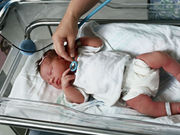Amount of virus was reduced 85 to 88 percent, compared with those who received the placebo
THURSDAY, Nov. 19, 2015 (HealthDay News) — An experimental drug shows promise as a treatment for respiratory syncytial virus (RSV), according to a study published in the Nov. 19 issue of the New England Journal of Medicine.
For the study, 62 volunteers were infected with RSV. The participants randomly received one of three doses of ALS-008176 or an inactive placebo drug. Treatment was given every 12 hours for five days.
Among those who received the highest doses, the amount of the virus was reduced 85 to 88 percent, compared with those who received the placebo, the researchers found. Moreover, the virus did not return after treatment, no serious side effects occurred, and no one discontinued treatment.
“These results highlight the drug’s potential as a safe and effective therapy for managing clinical disease,” Matthew McClure, M.D., of San Francisco-based Alios BioPharma Inc., told HealthDay. It’s currently being evaluated in RSV-infected infants, he added.
The research was funded by Alios BioPharma, the developer of ALS-008176.
Full Text (subscription or payment may be required)
Copyright © 2015 HealthDay. All rights reserved.








